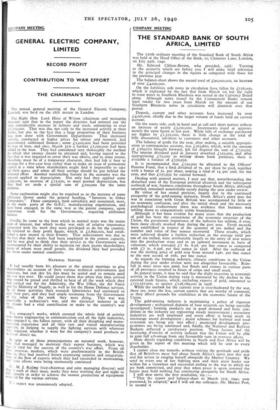PANY MEETING
GENERAL ELECTRIC COMPANY, LIMITED
RECORD PROFIT CONTRIBUTION TO WAR EFFORT THE CHAIRMAN'S REPORT The annual general meeting of the General Electric Company, Limited, was held on the r8th instant in London.
The Right Hon Lord Hirst of Witton (chairman and managing director) said that in the report the directors had pointed out the very considerable increase in debtors and stock, amounting to over ┬Ż1,700,000. That was due not only to the increased activity at their works, but also to the fazt that a large proportion of their business was now done with Government Departments That increased activity, conducted at higher prices for labour and material, had necessitated additional finance ; some ┬Ż1,000,000 had been provided by way of loan, and since March 31st a further ┬Ż1,00o,o00 had been added to the loan. They had considered very thoroughly the method by which that finance should be obtained and, having regard to the fact that it was required to cover their war efforts, and to some extent, therefore, must be of a temporary character, they had felt it best to arrange for a five-year loan rather than to make an issue of permanent capital at a time when shareholders might find it impossible to take up their quota and when all their savings should be put behind the national effort Another outstanding feature in the accounts was the amount applied to depreciation. Not only had they applied some /395,000, an increase of ┬Ż15,000, to meet normal depreciation, but they had set aside a special sum of Licio,000 for the same purpose.
Some explanation might also be required as to the increase of some k,Soo,000 shown under the general heading, "Interests in Other Companies." Those companies, both subsidiary and associated, were, in the main parts of the G.E.C. manufacturing organisation, and have been engaged, in the same way as the parent company, upon Important work for the Government, requiring additional finance.
Finally, he came to the item which in normal years was the major item of interest, but which to-day was only of relative importance compared with thc work they were privileged to do for the country. He referred to their profit figure, which, at Li,892,000, had estab- lished a new record in their history. That achievement was due to the fact that their works had been employed to the utmost capacity, and he was glad to think that their service to the Government was accompanied by their ability to maintain for their 30,000 shareholders, many of whom were small people, the dividend they had provided for them under normal conditions.
NATIONAL SERVICE
It had usually been his pleasure at the annual meetings to give shareholders an account of their various technical achievements and successes, but that day his lips must be sealed and so remain until the war was over. He could assure them that when that time arrived they would be proud and thrilled to hear of all the work which they had carried out for the Admiralty, the War Office, the Air Force and the Ministry of Supply, as well as for the Home Defence services. In all those activities their research laboratories had continued to Play their part, and they had ample testimony from the Government of the value of the work they were doing. This war was essentially a technician's war, and the electrical industry in all its phases had a vital contribution to make to the country's war effort.
The company's works, which covered the whole field of activity from heavy engineering to communication and all the light industries, were engaged tu the fullest extent, with all their designing and manu- facturing experience and all their vast and varied manufacturing capacity, in helping to supply the fighting services with whatever they required, whether it were for the company's usual products or in other directi
In spite 01 all those preoccupations on national work, however, they had managed . to maintain their export business, which was equ t.iy vital for the success of the country's war effort. From all then overseas markets, which were predominantly in the British rrtl- :re, they had received letters expressing surprise and congratula- tion, at the flow of exports which they had succeeded in maintaining, and hose efforts were being strenuously continued
M. J. Railing (vice-chairman and Joint managing director) said that t each of their many works they were working day and night to lull .:ipacity in order to achieve the utmost production of equipment essental for the various services.
report was unanimously adopted.






























 Previous page
Previous page